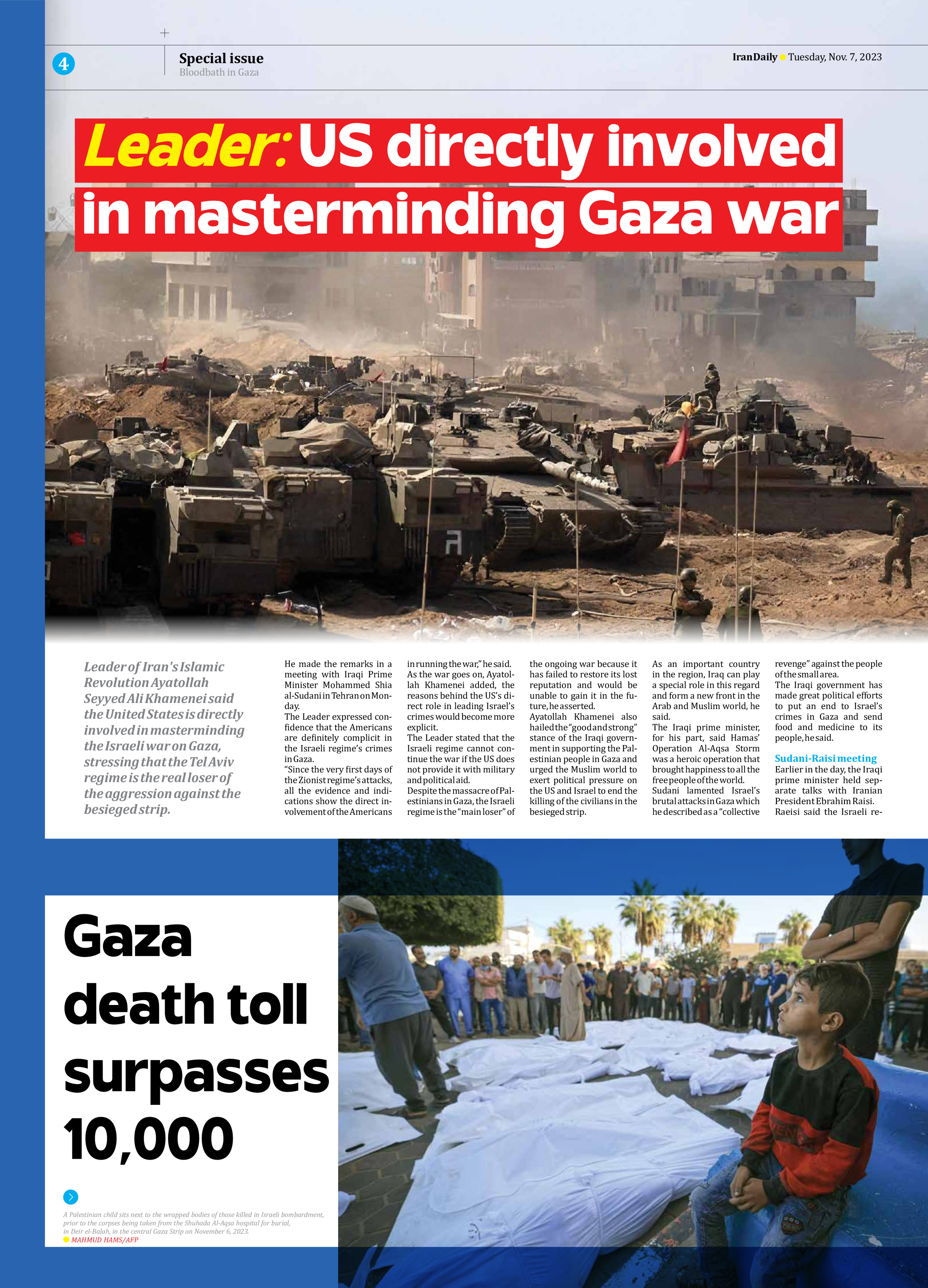
Gaza death toll surpasses 10,000
The Health Ministry in the Gaza Strip said Monday the death toll from the Israeli bombardment of the Palestinian territory had surpassed 10,000, nearly one month after the start of the conflict.
The toll of 10,022 deaths was announced in a press conference in Gaza by Health Ministry spokesman Ashraf al-Qidreh.
He said at least 292 Palestinians were killed overnight from Sunday into Monday in intense bombardments by the Israeli Army, which he accused of “perpetrating 19 massacres in the last hours”.
The majority of those killed in Gaza since the start of the war have been civilians, including more than 4,000 children.
The war in Gaza was triggered by the October 7 Hamas attacks, which killed 1,400 in southern occupied territories.
‘Enough is enough’
As the conflict between Hamas and Israel deepens, especially after Israel’s brutal attacks on the Gaza Strip, the heads of several major UN bodies made a united call for a humanitarian cease-fire in Gaza.
“An entire population is besieged and under attack, denied access to the essentials for survival, bombed in their homes, shelters, hospitals and places of worship. This is unacceptable,” the UN chiefs said in a joint statement.
“We need an immediate humanitarian cease-fire. It’s been 30 days. Enough is enough. This must stop now.”
Israel has rebuffed mounting international pressure for a cease-fire, saying captives taken by Hamas fighters should be released first.
On average, a child is killed and two are injured every 10 minutes during the war, the UN relief agency for Palestinians said.
Diplomatic efforts
US Secretary of State Antony Blinken, whose country is the biggest supporter of the Israeli war on Gaza, arrived in Turkey on the early hours of Monday, following a whirlwind tour of the Middle East during which he heard a chorus of Arab calls for an immediate cease-fire.
Blinken held 2.5 hours of one-on-one talks in Ankara with Turkish Foreign Minister Hakan Fidan, who pressed the US official to support an “immediate” cease-fire.
Blinken said that Washington was working “very aggressively” to substantially expand the amount of aid reaching trapped civilians in Gaza.
EU foreign policy chief Josep Borrell also on Monday suggested a plan under which Israel could suspend its military operation in Gaza in return for the Red Cross getting access to captives held by Hamas.
“Call it a truce, window, whatever, but we need that violence recedes and that international humanitarian law is being respected,” Borrell said.
Borrell warned that an “overreaction by the Israelis in the end makes them lose the support of the international community”.
“There is no military solution to the conflict,” Borrell said. “Even if Hamas is uprooted in Gaza, this will not solve the problem of Gaza.”
Risk of broader war
Russia on Monday called for an end to the fighting in Gaza and said a resumption of Palestinian-Israeli negotiations was essential to avoid the risk of a broader war and an increase in “terrorist activity”.
“The priority today is the speedy cessation of hostilities in Gaza,” Russia’s Foreign Ministry said. “If not, we will face the risks of radicalization and an increase in terrorist activity and the danger of the conflict expanding its geography.”
Anti-Israel sentiments
Anti-Israel sentiments are rising across the world following the regime’s killing of innocent civilians in Gaza. Cities across the world are the scene of demonstrations in support of Palestinians. Many countries have also taken some measures to show their anger at the regime’s actions in Gaza.
On Monday, the South African government said it would recall all its diplomats from Israel to signal its concern over the situation in Gaza.
Many countries including Turkey, Chile, Colombia, Jordan, Bahrain and Honduras have also recalled their envoys. Meanwhile, Bolivia became the first nation to sever diplomatic ties with Israel over its “disproportionate” attacks in Gaza. South Africa said the position of the Israeli ambassador to the country was becoming “more and more untenable”, accusing the diplomat of having made “disparaging remarks” about people criticizing Israel.
“The South African government has decided to withdraw all its diplomats in Tel Aviv for consultation,” Khumbudzo Ntshavheni, a minister in the president’s office, told a press briefing without providing further details.
Pretoria has long been a vocal supporter of the Palestinian cause, with the ruling African National Congress (ANC) often linking it to its own struggle against apartheid.
Numerous pro-Palestine protests have taken place across South Africa over the past month.







